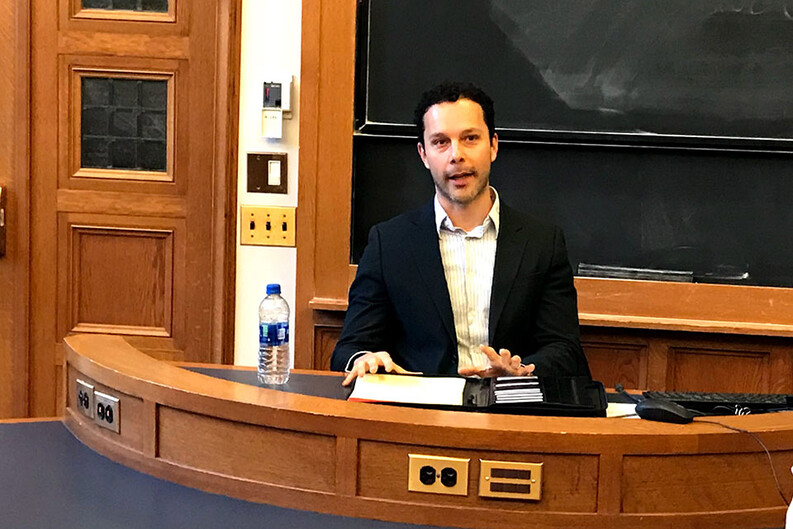Efrén Olivares ’08 Leads Human Rights Workshop on Family Separation

Efrén C. Olivares ’08 vividly remembers Jeff Sessions’s press conference announcing the Trump administration’s “zero tolerance” policy of all individuals who enter the U.S. illegally. As Olivares told the audience at the Human Rights Workshop4 on October 18, 2018, he particularly remembers Sessions’s declaration, “If you are smuggling a child, then we will prosecute you and that child will be separated from you as required by law…If you don’t like that, then don’t smuggle children over our border.”
Olivares is the Racial and Economic Justice Program Director at the Texas Civil Rights Project5 (TCRP). The day after Sessions’s press conference, Olivares received a call from the head public defender in McAllen, TX. She described the scene at their courthouse: more than 200 people were in shackles, detained for prosecution for illegal entry; many had been separated from their children, and no one knew where the children had been taken.
The public defender asked Olivares what TCRP could do to help. Olivares and his paralegal were at the courthouse in McAllen the next morning and began interviewing dozens of parents. Olivares reflected that nothing could have prepared them for the magnitude of parents’ suffering in their home countries and now in the U.S. “When I got to McAllen,” said Olivares, “I had a sense that what I was seeing couldn’t be happening in the U.S. in 2018. Even if it was technically legal to separate children from their parents, it was fundamentally wrong from a human rights perspective.”
He remembered one woman who was being targeted by the same gang that murdered her husband. “She traveled all the way to the U.S. with her son,” he reported, “only to have him taken away at the border.” Olivares recounted several other stories that, he said, “still give him goosebumps” — one parent was told that their child was just being taken away for a bath, when in fact the child put into the custody of the Office of Refugee Resettlement (ORR); when one father was told that his daughter was going to be taken away from him, he tried to comfort her by telling her that she was going away to summer camp.
Olivares went on, “I’ve been doing this work for many years and I have never experienced something so difficult on a personal level. But helping these people was something we did without thinking — it’s not like we had a choice.”
Olivares and his colleagues knew that documenting separations was an essential task that the federal government was not performing. Indeed, it was apparent to Olivares that there was a total lack of coordination among the federal agencies responsible for carrying out the zero-tolerance policy. As Olivares explained, ORR, which ended up with many separated children in their custody and treated them like unaccompanied minors, “was not in the business of reuniting children with people in immigration detention, and ICE was not in the business of looking for the children of people who were in their custody.” Instead, ICE would deport people regardless of whether they had children. “The bottom line was that no one had answers for these parents about where their children were,” said Olivares.
At the end of May 2018, TCRP filed an emergency request asking the Inter-American Commission on Human Rights (IACHR) to demand that the U.S. government immediately reunify children and families and cease separating families (the U.S. government has still not responded to the IACHR’s ruling in favor of TCRP). TCRP’s next move was to secure legal representation from law firms and ally organizations for the parents they had interviewed. By June 26, 2018, when a federal judge in San Diego issued a nationwide injunction stopping family separation, TCRP had interviewed 382 parents. With the help of legal representation, 102 of these parents were released and reunited with their children.
TCRP is also trying to track down another 120 of its interviewees who are missing — neither their nor their children’s information is in ICE’s or ORR’s systems. Olivares speculated that these parents and their children were deported together, but, he said, “We don’t know for sure and are trying to find out.” Moreover, TCRP is advocating for other parents who were not protected by the June 26 injunction because they have a criminal history and whom the U.S. government is still refusing to reunite with their children (even though, as Olivares emphasized, none of them have been convicted of violent crimes and no child welfare agency has deemed them unfit to be parents).
“The lack of accountability is what really gets to me,” said Olivares. “No one in the agencies responsible for separating families has lost their job or been charged with anything.”
Olivares argued that the harm done to both parents and children who were separated from one another could qualify as torture under both the Convention Against Torture and U.S. law. He added that the U.S. also violated domestic law and the Refugee Convention by criminalizing asylum-seekers under the zero-tolerance policy, and by having CBP agents turn away asylum-seekers before they reach the border and restricting the number who can enter the country each day.
To conclude, Olivares stressed that family separation should not be lumped in with the larger, more polarized debate in the U.S. about immigration policy, emphasizing, “We should at least agree that existing laws, treaties and constitutional standards should be respected.”


